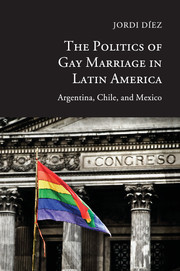Description
The Politics of Gay Marriage in Latin America
Argentina, Chile, and Mexico
Author: Díez Jordi
Díez explores how and why Latin America has become a leader among nations in the passage of gay marriage legislation.
Language: English
Subject for The Politics of Gay Marriage in Latin America:
The Politics of Gay Marriage in Latin America
Publication date: 09-2016
Support: Print on demand
Publication date: 09-2016
Support: Print on demand
The Politics of Gay Marriage in Latin America
Publication date: 05-2015
301 p. · 16x23.6 cm · Hardback
Publication date: 05-2015
301 p. · 16x23.6 cm · Hardback
Description
/li>Contents
/li>Biography
/li>
Addressing one of the defining social issues of our time, The Politics of Gay Marriage in Latin America explores how and why Latin America, a culturally Catholic and historically conservative region, has become a leader among nations of the Global South, and even the Global North, in the passage of gay marriage legislation. In the first comparative study of its kind, Jordi Díez explains cross-national variation in the enactment of gay marriage in three countries: Argentina, Chile, and Mexico. Based on extensive interviews in the three countries, Díez argues that three main key factors explain variation in policy outcomes across these cases: the strength of social movement networks forged by activists in favor of gay marriage; the access to policy making afforded by particular national political institutions; and the resonance of the frames used to demand the expansion of marriage rights to same-sex couples.
1. Introduction; Part I. Setting the Stage: 2. Citizenship, sexuality, and gay marriage; 3. State-society relations in the twentieth century; 4. Early mobilization: the long road to gay marriage; Part II. Explaining Policy Stasis and Change in Gay Marriage: 5. Argentina: the precursor in policy reform; 6. Mexico: a case of fragmented reform; 7. Chile: a case of policy stasis; 8. Conclusion.
Jordi Díez is Associate Professor of Political Science at the University of Guelph. The author of four previous books, he has also published numerous journal articles on social movements and public policy. A recipient of several research awards from organizations including the Social Sciences and Humanities Research Council (SSHRC) and the International Development Research Council (IDRC), he has taught at several universities in the Americas and Europe and was recently named a Peggy Rockefeller Visiting Scholar at Harvard University, Massachusetts.
© 2024 LAVOISIER S.A.S.




